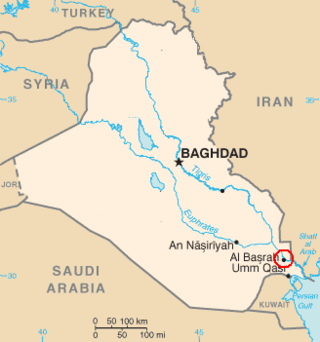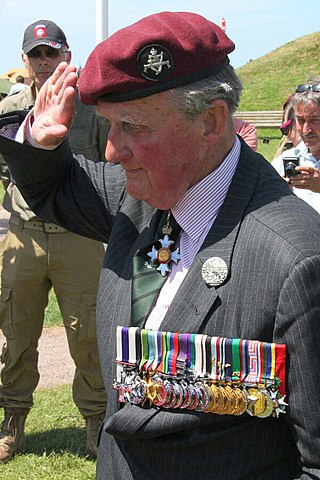Major General Jawad Rumi Daini (born ca. 1948) is a former general in the Iraqi Army who currently lives in exile in Egypt.
Daini fought in the Iran–Iraq war, and served in the Iraqi Army under the Baathist government until he was forced into retirement in July 1990 after it was discovered that his brother was a member of the Badr Brigade. After the invasion he was faced with the problem of whether to join the Iraqi Army or the Iraqi insurgency. Eventually he was asked to join the new Iraqi Army and was enlisted in January 2004. Under his command he established the 2nd Brigade of the 6th Division.
He was eventually forced into retirement following three major events. He was one of the two Iraqi commanders overseeing the Al-Aaimmah bridge when the 2005 Baghdad bridge stampede occurred. During the subsequent investigation numerous conflicting testimonies were heard regarding who was responsible for the stampede. Eventually both men were cleared of all charges.
The second major event leading to his retirement was a raid at a police station in Jadriya. Following a tip that a kidnapped boy was being detained at the station, US and Iraqi forces raided the police station, finding hundreds of malnourished prisoners being kept in cramped conditions. Daini was criticized by the Iraqi Army for not tipping them off about the raid.
Tensions between Daini and the political establishment continued to grow until reaching a boiling point in June 2006 when Daini's soldiers arrested a Mahdi Army death squad. Daini refused to release the men following several requests by phone from the new prime minister Nouri Maliki. On July 2 the Cabinet decided to release him from the army.
Following his forced retirement, his son Haidar was abducted and murdered, with his body being discovered in a neighborhood controlled by the Mahdi Army. As a result of this and continued threats Daini and his wife and two daughters fled to Egypt.

Moshe Dayan was an Israeli military leader and politician. As commander of the Jerusalem front in the 1948 Arab–Israeli War, Chief of the General Staff of the Israel Defense Forces (1953–1958) during the 1956 Sinai War, and as Defense Minister during the Six-Day War in 1967, he became a worldwide fighting symbol of the new state of Israel.

The 35th "Paratroopers" Brigade is an Israeli military airborne infantry brigade. It forms a major part of the Israeli Ground Forces' Infantry Corps, and has a history of carrying out special operations from the 1950s onwards. Soldiers of the brigade wear maroon berets with the Infantry Corps pin and russet boots.

The Mahdi Army was an Iraqi Shia militia created by Muqtada al-Sadr in June 2003 and disbanded in 2008.

Amarah, also spelled Amara, is a city in south-eastern Iraq, located on a low ridge next to the Tigris River waterway south of Baghdad about 50 km from the border with Iran. It lies at the northern tip of the marshlands between the Tigris and Euphrates.

After the 2003 invasion of Iraq was completed and the regime of Saddam Hussein was toppled in May 2003, an Iraqi insurgency began that would last until the United States left in 2011. The 2003–2006 phase of the Iraqi insurgency lasted until early 2006, when it escalated from an insurgency to a Sunni-Shia civil war, which became the most violent phase of the Iraq War.
Events in the year 2005 in Iraq.

The Anglo-Iraqi War was a British-led Allied military campaign during the Second World War against the Kingdom of Iraq, then ruled by Rashid Gaylani who had seized power in the 1941 Iraqi coup d'état with assistance from Germany and Italy. The campaign resulted in the downfall of Gaylani's government, the re-occupation of Iraq by the British, and the return to power of the Regent of Iraq, Prince 'Abd al-Ilah, a British ally.

The 2004 Iraq spring fighting was a series of operational offensives and various major engagements during the Iraq War. It was a turning point in the war; the Spring Fighting marked the entrance into the conflict of militias and religiously based militant Iraqi groups, such as the Shi'a Mahdi Army.

Operation Imposing Law, also known as Operation Law and Order, Operation Fardh al-Qanoon or Baghdad Security Plan (BSP), was a joint Coalition-Iraqi security plan conducted throughout Baghdad. Under the Surge plan developed in late 2006, Baghdad was to be divided into nine zones, with Iraqi and American soldiers working side by side to clear each sector of Shiite militias and Sunni insurgents and establish Joint Security Stations so that reconstruction programs could begin in safety. The U.S. military commander in Iraq, David Petraeus, went so far as to say Iraq would be "doomed" if this plan failed. Numerous members of Congress stated the plan was a critical period for the U.S. presence in Iraq.

Operation Ancient Babylon was the code name given to the deployment of Italian forces during the Iraq War. Their mission lasted from 15 July 2003 to 1 December 2006. The troops were located in and around Nasiriyah.
Operation Lion's Leap was a joint US-Iraqi operation against the Mahdi Army in Diwaniyah, 180 kilometers south of Baghdad. The division-level operation was launched on 17 November 2007 by Iraqi Army and police forces, with a US brigade in support. At least 74 Mahdi Army militiamen were captured and at least two major weapons caches were discovered.

The Battle of Basra began on 25 March 2008, when the Iraqi Army launched an operation to drive the Mahdi Army militia out of the southern Iraqi city of Basra. The operation was the first major operation to be planned and carried out by the Iraqi Army since the invasion of 2003.

The 2008 Iraq spring fighting was a series of clashes between the Mahdi Army and allies and the Iraqi Army supported by coalition forces, in southern Iraq and parts of Baghdad, that began with an Iraqi offensive in Basra.

The siege of Sadr City was a blockade of the Shi'a district of northeastern Baghdad carried out by US and Iraqi government forces in an attempt to destroy the main power base of the insurgent Mahdi Army in Baghdad. The siege began on 4 April 2004 – later dubbed "Black Sunday" – with an uprising against the Coalition Provisional Authority following the government banning of a newspaper published by Muqtada Al-Sadr's Sadrist Movement. The most intense periods of fighting in Sadr City occurred during the first uprising in April 2004, the second in August the same year, during the sectarian conflict that gripped Baghdad in late 2006, during the Iraq War troop surge of 2007, and during the spring fighting of 2008.

Operation Pleshet was an Israeli military action near the village of Isdud from May 29 to June 3, 1948 during the 1948 Arab–Israeli War. Isdud was on the Israeli southern front against the Egyptian Army, and the operation was aimed at capturing the village and stopping the Egyptian advance northwards. While only the June 2–3 engagements are officially named Operation Pleshet, the events immediately preceding are historiographically joined with it.

The Battle of Ginnis was a minor battle of the Mahdist War that was fought on December 30, 1885, between soldiers of the Anglo-Egyptian Army and warriors of the Mahdist State. The battle was caused by the Mahdist blockade of the Ginnis-Kosha Fort, which British commanders hoped to relieve.
Operation Death to the Invader, also Death to the Invaders, was an Israeli military operation during the 1948 Arab–Israeli War. It was carried out on July 16–18, 1948 in the northwestern Negev desert. The operation's objective was to link Jewish villages in the Negev desert with the rest of Israel, after this aim was not achieved in Operation An-Far that ended on July 15. The Egyptians blocked Israeli access to its Negev villages during the first truce of the war, by taking up positions on the Majdal – Bayt Jibrin road, where most of the battles of Death to the Invaders were fought.

Danny Matt was a decorated career Israeli military officer who served in the Israel Defense Forces from 1948 until 1992. He attained the rank of major general and fought in five Arab-Israeli wars, including the wars of 1948 and 1973. Among his many exploits was a daring operation involving leading a paratroop force across the Suez Canal during the Yom Kippur War. The operation was the beginning phase of a larger Israeli counter offensive that ultimately led to the victory of the Israeli army.

Major-General Corran William Brooke Purdon was an Irish-born career soldier in the British Army, who took part in the raid on St Nazaire as a commando for which he was awarded the Military Cross. He was subsequently a prisoner in Colditz Castle.
The Qarmatian invasion of Iraq was a large-scale raid by the Qarmatians of Bahrayn against the Abbasid Caliphate's metropolitan region of Iraq, that began in autumn of 927 and continued until the summer of 928.















